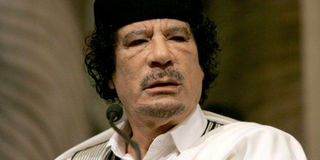Who can lead a united Africa?

Political integration is different from Muamar Gaddafi’s one-Africa dream
On a state visit which President Museveni made to Guinea-Conakry, West Africa in June, it emerged that the Ugandan leader, aside from holding talks with the Guinean leader, Prof Alpha Conde, submitted a report on political integration of Africa. Museveni revealed that he was tasked by the African Union to write an expert paper on the subject last year when Mr Conde was still chairman of the AU.
I did not see press reports on assigning the role of vision-bearer for African political integration to the Ugandan leader. For the handover of his report, I only got to know from a press release issued by State House in which the subject was captured somewhere in the body of the press release. I thought it was an extraordinary matter worth front page coverage. At present, contents of his report are undisclosed, but Museveni’s ceaseless advocacy for African integration is renowned. I suppose that is why it was easy to zero on him to write the report.
President Conde, while on a state visit to Uganda last year, noted that Africa, driven by a new dynamism, would realise its vision and that Museveni was “one of our founding fathers of this new dynamism. With this new vision, we discuss further how to bring these positive changes about. Museveni is one of our champions and is incharge of political integration.”
Conde expressed confidence in Museveni. “We have experienced what President Museveni has done to move forward in development. My visit is to show admiration and support what he has done for Uganda. I always have admiration for Museveni, for his frankness and courage of speaking his mind even when it does not please others. President Museveni has a great track record and can help us move forward. Museveni is focused and has the ideology. We want to use that to be able to deliver with our new vision.
Our countries need to be managed for the benefit of the youth and the women. We want no interference, but also no impunity. We need to have our own and not be told what to do. African leaders need to speak openly and frankly so that when Africa speaks, it does so with one voice that is heard”. President Conde was the chairperson of the AU at the time.
Fast forward, in July 2018, India’s Prime Minister, Narendra Modi, visited Uganda. In his address to Parliament, he gave his guarantee in respect to Africa’s potential growth from uncertainty to strength and equality with other blocs. He was of the view that as global engagement in Africa increases, “we must all work together to ensure that Africa does not once again turn into a theatre of rival ambitions, but becomes a nursery for the aspirations of Africa’s youth.”
In acknowledging Modi, Museveni said: “Our friends in the world should know that the long night of African subjugation and marginalisation is over.” Beside Modi’s India, China has also acted with conspicuous goodwill for Africa’s “oneness”.
Verily, through strength, you get peace, development; even (true) democracy, and political integration is the foundation. Political integration is different from Muamar Gaddafi’s one-Africa dream because, while the latter sought to negate internal borders and create one large country, the former is more about intensification of compatibilities in governance while maintaining individual state sovereignties. Who can lead a United Africa and when?
Robert Atuhairwe,
[email protected]




